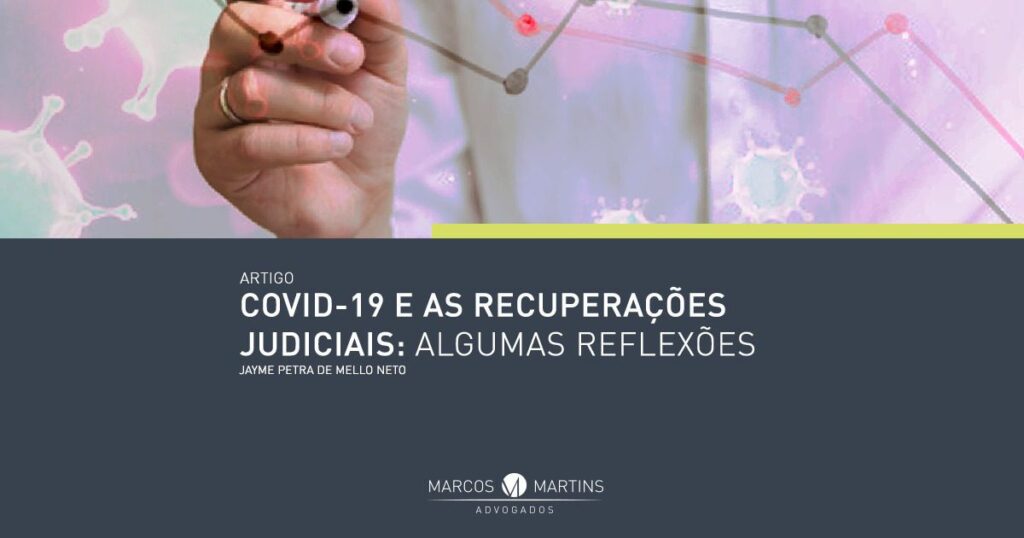Jayme Petra de Mello Neto
Lawyer at Marcos Martins Advogados
In the wake of the critical economic situation that is looming with the COVID-19 pandemic, much has been studied and said about the impacts on labor relations, contracts and economic interests.
Little thought has been given, however, when the issue involves one of the parties in Judicial Recovery. Especially when the party in question is the recovering party.
Just to remind you of some of the vectors of Judicial Recovery, it is always important to bear in mind that the main objective of this legal remedy is to make it possible to overcome the debtor’s economic and financial crisis. This main objective is the guiding principle that establishes and enables a given company to benefit from Judicial Recovery.
Therefore, from the outset, those already in the process of judicial reorganization are critically compromised from an economic and financial point of view. And as a solution to this critical state, the law has chosen the market itself as the judge of reasonableness and recovery capacity. Although the procedure takes place in court, the “de facto judge” of a company’s ability to recover is its collective creditors and partners. This is what is known as the business judgment rule, whereby the market is a better judge than the judiciary itself.
In a “normal” economic situation, the normal flow of a Judicial Recovery is divided into 2 major moments, with the approval of a Judicial Recovery Plan as the dividing line. This is an economic and business projection that models one or more solutions for the company’s recovery. And the Plan must be reasonable for the market at both times: before the Plan is approved, as an indication to the market of good faith; after approval, as a way of demonstrating the correctness of the business judgment made by the creditors gathered at the Meeting.
It is also important to bear in mind that since the change in the legal system in 2005, the objective has been the recovery of the company, as something that interests all stakeholders. The old system, which was purely concordatary in nature, was aimed only at the equal satisfaction of credit, as a maxim of the bankruptcy precept of par conditio creditorum.
Recover is the watchword. But how do you recover, or maintain the recovery plan, when a general crisis arises, superimposed on the particular crisis of the company being recovered?
It is at times like these that the law evolves, when the structure it has established is put to the test, relying on the good reason of legal operators and market agents.
The legalist, the one who can no longer see beyond the simple cold mechanics of the letter of the law, needs to leave room for all those who propose to interpret the law in a rational manner, in accordance with the reality of the moment and the future that challenges it.
Just to start the debate, consider, for example, the rule of conversion into bankruptcy in the event of non-compliance with the obligations assumed with the Recovery Plan. To what extent should this rule be strictly observed or, under the influence of the Pandemic, can the Theory of Imprediction be applied and force the Plan to be revised, disregarding any moratorium effects?
Even if the situation is serious and effectively unforeseen, when the Theory of Imprediction is considered as a factor in modifying legal transactions, it should also be noted that the parties are required, as a duty linked to good faith, to try their best to comply with the agreement, even if in a modified form. They are required to observe the attached duty to cooperate before the business relationship is terminated.
Or imagine the situation of a company that has filed for Judicial Reorganization and has created a specific scenario in the draft Plan or even in the draft Plan already filed and is now facing a widespread critical situation. What is the solution? The first measures have already been taken, but they are still precautionary, in that assemblies are being postponed by judges and the protection of the stay period is being extended.
Many issues will arise involving companies in critical situations. Our efforts are to make a law, designed for a normal economy and geopolitical situation, compatible with an unforeseen crisis, superimposed on the individual crisis.
[rock-convert-pdf id=”13722″]








